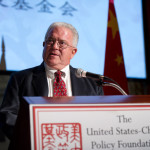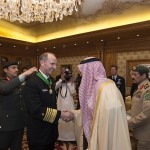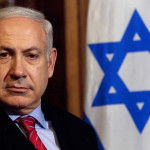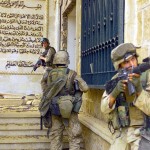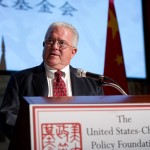via SUSRIS
SUSRIS Editor’s Note: Over the last two years the twin crises in Egypt and Syria have placed a heavy diplomatic and security burden on leaders and policymakers in the Kingdom of Saudi Arabia and the United States. Washington and Riyadh have worked closely [...]
via LobeLog
by Chas Freeman
An acquaintance who, like me, used to work on foreign affairs in the U.S. government, told me the other day that he thought that, in going after Bashar al-Assad, President Barak Obama had decided on an approach more akin to Bush 41 (carefully building a consensus) than Bush 43 [...]
by Jim Lobe
via IPS News
As the administration of President Barack Obama continues wrestling with how to react to the military coup in Egypt and its bloody aftermath, officials and independent analysts are increasingly worried about the crisis’s effect on U.S. ties with Saudi Arabia.
The oil-rich kingdom’s strong support [...]
by Chas Freeman
via the Middle East Policy Council
It is a privilege to have been asked to join this discussion of Jacob Heilbrunn’s account of Israel’s fraying image. His article seems to me implicitly to raise two grim questions.
The first question is [...]
by Mitchell Plitnick
via IPS News
The Oslo peace process has failed and Europe must take stronger leadership in the Middle East, according to a distinguished group of former European leaders that is pushing for a stronger and more independent European stance on the Israeli occupation.
And some United States analysts believe the [...]
via Lobe Log
by Jasmin Ramsey
I wanted Iraq to dominate our postings this week, the 10th anniversary of the US invasion of the country. The work of Daniel, Jim and James received ample attention, though Americans don’t appear to have much of an appetite for remembering the disastrous [...]
via Lobe Log
Amb. Chas Freeman (ret.) spoke to a Middle East Policy Council (MEPC) forum on U.S. Grand Strategy — or, in his words “Grand Waffle” — in the Middle East on Capitol Hill yesterday and has graciously agreed to have the text posted on Lobe Log. Readers of the blog are already [...]
via Lobe Log
As readers of this blog know, I have the highest regard for Amb. Chas Freeman (ret.) not only as one of this country’s most accomplished diplomats, but also as a extraordinarily insightful analyst of current global developments and their impact on U.S. foreign policy. This is undoubtedly why former Director of [...]
All four of the ambassadors who received recess appointments from President Obama were considered fully qualified by the Senate Foreign Relations Committee, who approved their nominations and sent them to the full Senate for confirmation. All have been kept from taking up their diplomatic posts on by unilateral actions on the part of one or two senators, who prevented their appointments from reaching the Senate floor for the votes that almost certainly would have confirmed them.
The U.S. media has been quick to accept that Arab countries share a hawkish view on Iran after the release of the WikiLeaks cables. The New York Times was at the front of this push to portray Arab leaders as just as hawkish as Israeli Prime Minister Benjamin Netanyahu’s Likud party on Iran.
“The cables [...]
En Español
The Latest
 From IPS News
From IPS News- Portable Ginnery Could Revive Kenya’s Ailing Cotton Industry
- Who Should be the Next UN Leader?PART 5
- Who Should be the Next UN Leader?PART 4
- ‘Living in Fear’: Landowners in Uganda’s Oil Field on Brink of Eviction
- Better Incentives Needed to Expand Solar Energy in Cuba
- Africa Pushing Limits To Boost Renewable Energy Supply Chain, Security
- Who Should be the Next UN Leader?PART 3
- Trade Deception Returns in Pan-Africanist Guise
- Solar Power and Biogas Empower Women Farmers in Brazil
- Migration in the Americas: A Dream That Can Turn Deadly
- Online fundraising for IPS Inter Press Service at Razoo






